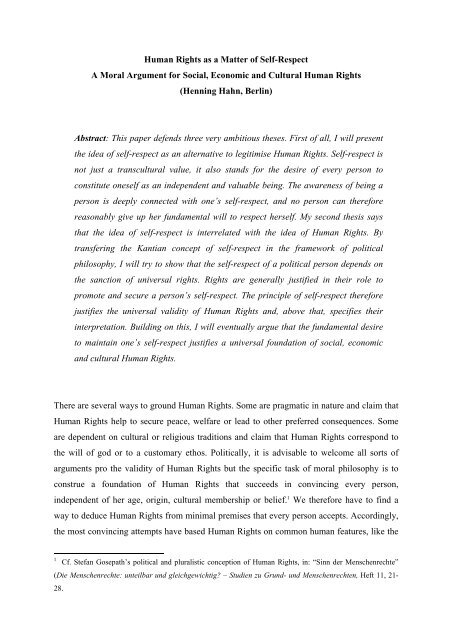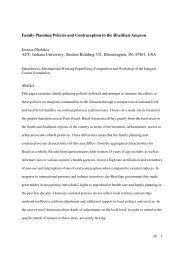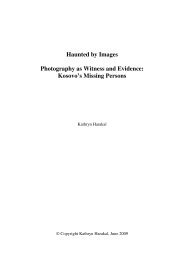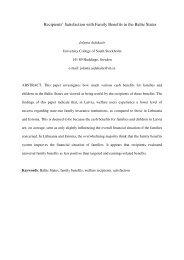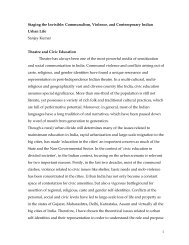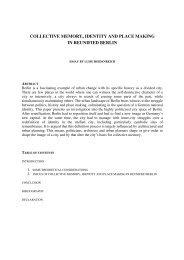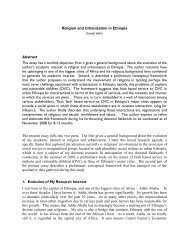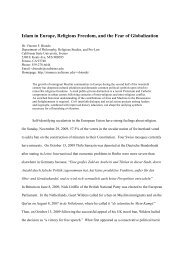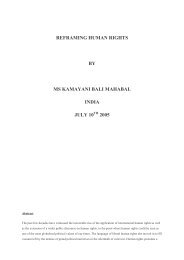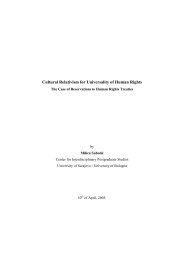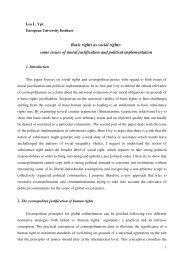Human Rights as a Matter of Self-Respect - Irmgard Coninx Stiftung
Human Rights as a Matter of Self-Respect - Irmgard Coninx Stiftung
Human Rights as a Matter of Self-Respect - Irmgard Coninx Stiftung
You also want an ePaper? Increase the reach of your titles
YUMPU automatically turns print PDFs into web optimized ePapers that Google loves.
<strong>Human</strong> <strong>Rights</strong> <strong>as</strong> a <strong>Matter</strong> <strong>of</strong> <strong>Self</strong>-<strong>Respect</strong><br />
A Moral Argument for Social, Economic and Cultural <strong>Human</strong> <strong>Rights</strong><br />
(Henning Hahn, Berlin)<br />
Abstract: This paper defends three very ambitious theses. First <strong>of</strong> all, I will present<br />
the idea <strong>of</strong> self-respect <strong>as</strong> an alternative to legitimise <strong>Human</strong> <strong>Rights</strong>. <strong>Self</strong>-respect is<br />
not just a transcultural value, it also stands for the desire <strong>of</strong> every person to<br />
constitute oneself <strong>as</strong> an independent and valuable being. The awareness <strong>of</strong> being a<br />
person is deeply connected with one’s self-respect, and no person can therefore<br />
re<strong>as</strong>onably give up her fundamental will to respect herself. My second thesis says<br />
that the idea <strong>of</strong> self-respect is interrelated with the idea <strong>of</strong> <strong>Human</strong> <strong>Rights</strong>. By<br />
transfering the Kantian concept <strong>of</strong> self-respect in the framework <strong>of</strong> political<br />
philosophy, I will try to show that the self-respect <strong>of</strong> a political person depends on<br />
the sanction <strong>of</strong> universal rights. <strong>Rights</strong> are generally justified in their role to<br />
promote and secure a person’s self-respect. The principle <strong>of</strong> self-respect therefore<br />
justifies the universal validity <strong>of</strong> <strong>Human</strong> <strong>Rights</strong> and, above that, specifies their<br />
interpretation. Building on this, I will eventually argue that the fundamental desire<br />
to maintain one’s self-respect justifies a universal foundation <strong>of</strong> social, economic<br />
and cultural <strong>Human</strong> <strong>Rights</strong>.<br />
There are several ways to ground <strong>Human</strong> <strong>Rights</strong>. Some are pragmatic in nature and claim that<br />
<strong>Human</strong> <strong>Rights</strong> help to secure peace, welfare or lead to other preferred consequences. Some<br />
are dependent on cultural or religious traditions and claim that <strong>Human</strong> <strong>Rights</strong> correspond to<br />
the will <strong>of</strong> god or to a customary ethos. Politically, it is advisable to welcome all sorts <strong>of</strong><br />
arguments pro the validity <strong>of</strong> <strong>Human</strong> <strong>Rights</strong> but the specific t<strong>as</strong>k <strong>of</strong> moral philosophy is to<br />
construe a foundation <strong>of</strong> <strong>Human</strong> <strong>Rights</strong> that succeeds in convincing every person,<br />
independent <strong>of</strong> her age, origin, cultural membership or belief. 1 We therefore have to find a<br />
way to deduce <strong>Human</strong> <strong>Rights</strong> from minimal premises that every person accepts. Accordingly,<br />
the most convincing attempts have b<strong>as</strong>ed <strong>Human</strong> <strong>Rights</strong> on common human features, like the<br />
1<br />
Cf. Stefan Gosepath’s political and pluralistic conception <strong>of</strong> <strong>Human</strong> <strong>Rights</strong>, in: “Sinn der Menschenrechte”<br />
(Die Menschenrechte: unteilbar und gleichgewichtig? – Studien zu Grund- und Menschenrechten, Heft 11, 21-<br />
28.
desire for freedom or recognition, the interest to live a flourishing life, the desire to be self-<br />
determined, the fear <strong>of</strong> death or the wish to realize one’s own idea <strong>of</strong> a good life. Obviously<br />
these ide<strong>as</strong> are candidates for fundamental and perspective-independent values to which<br />
almost every human being could agree.<br />
Prima facie all <strong>of</strong> these alternatives seem to be attractive, but in the end we have to admit that<br />
they remain very vague. In sorting out all cultural particularities, our attempt to find<br />
universally accepted premises winds up with rather meaningless notions, and it is hard to see<br />
how we can justify substantial <strong>Human</strong> <strong>Rights</strong> on the b<strong>as</strong>is <strong>of</strong> ide<strong>as</strong> that are strictly speaking<br />
empty. In fact, all our enlisted candidates come down to the idea that everyone h<strong>as</strong> a<br />
fundamental right to live his own life and that this life ought to be a somehow satisfying life<br />
(while we may leave open how to define what that means). But why should that be so and<br />
where does the normative claim to a right and even to a universal right enter the argument?<br />
We are usually satisfied with the indication that our <strong>Human</strong> <strong>Rights</strong> are, so to speak, natural<br />
rights protecting some sort <strong>of</strong> an inborn human dignity. Or we appeal, like the American<br />
Declaration <strong>of</strong> Independence does, to a divine m<strong>as</strong>ter plan that guarantees these rights. But<br />
this is a relapse into a cultural-relative re<strong>as</strong>oning and, thus, we have to start again in order to<br />
find a universal foundation <strong>of</strong> <strong>Human</strong> <strong>Rights</strong>.<br />
In this essay I will introduce a prominent idea in recent moral and political theory, which<br />
qualifies <strong>as</strong> a more suitable candidate to mark a universally shared and fundamental value and<br />
which additionally explains why every person h<strong>as</strong>, <strong>as</strong> a person, a right to liberty, political<br />
participation, an appropriate living standard and all the claims that we intuitively take to be<br />
part <strong>of</strong> a catalogue <strong>of</strong> <strong>Human</strong> <strong>Rights</strong>. This hopeful alternative is the well-known concept <strong>of</strong><br />
self-respect, <strong>as</strong> John Rawls h<strong>as</strong> succesfully reintroduced it into political philosophy. 2<br />
In this paper, I will try to show why I think that the concept <strong>of</strong> self-respect does a better<br />
foundational job than its alternatives. I will therefore argue for three very ambitious theses.<br />
First <strong>of</strong> all, I will pave the way for an understanding <strong>of</strong> self-respect that clarifies why selfrespect<br />
is a fundamental value for every person regardless <strong>of</strong> her cultural background. In<br />
defending the concept <strong>of</strong> self-respect against the reproach that it is grounded in western<br />
individualism, I will argue that self-respect is the precondition for being a self-<strong>as</strong>sured person<br />
<strong>as</strong> such and that every person <strong>as</strong> a person h<strong>as</strong> an interest to maintain her self-respect at almost<br />
2 See John Rawls, A Theory <strong>of</strong> Justice. Revised Edition, Oxford University Press, 1999.
any price. 3 My second thesis says that self-respect goes hand in hand with a sense <strong>of</strong> justice.<br />
<strong>Respect</strong>ing oneself <strong>as</strong> a person implicates respecting oneself from the point <strong>of</strong> view <strong>of</strong><br />
objective and just laws. This Kantian idea means that our self-respect depends on universal<br />
moral principles that we autonomously give to ourselves. By considering our lives in the light<br />
<strong>of</strong> universal laws, we constitute ourselves <strong>as</strong> morally independent persons. I will transfer this<br />
moral idea to political philosophy by trying to demonstrate that the self-respect <strong>of</strong> a political<br />
person depends on the sanctioning <strong>of</strong> universal rights. 4 <strong>Rights</strong> are generally justified in their<br />
role to promote and secure the self-respect <strong>of</strong> each person. As such, the concept <strong>of</strong> self-respect<br />
marks a principle on which we can justify the universal validity <strong>of</strong> <strong>Human</strong> <strong>Rights</strong> and, above<br />
that, which helps us to specify the legitimation, the meaning and the interpretation <strong>of</strong> existing<br />
catalogues <strong>of</strong> <strong>Human</strong> <strong>Rights</strong>. Building on this, I will eventually and briefly discuss the<br />
problem whether the principle <strong>of</strong> self-respect justifies solely the cl<strong>as</strong>sical liberal rights <strong>of</strong><br />
enjoying freedom from constraint, or whether the protection <strong>of</strong> our self-respect endows us<br />
with good re<strong>as</strong>ons for guaranteeing further rights which promote the ability to spend a<br />
satisfying life. In this context, I will hold and defend the view that the principle <strong>of</strong> self-respect<br />
leads us to a foundation <strong>of</strong> social, economic and cultural <strong>Human</strong> <strong>Rights</strong>.<br />
1. <strong>Self</strong>-<strong>Respect</strong> <strong>as</strong> a Fundamental Value<br />
My first aim is to prove that self-respect is a fundamental value that everyone holds to be<br />
indispensable regardless <strong>of</strong> her belief, origin or worldview. What renders the concept <strong>of</strong> selfrespect<br />
more b<strong>as</strong>ic than other foundational concepts is that our self-respect is not related to a<br />
specific idea <strong>of</strong> a person’s well-being, but to the more fundamental idea <strong>of</strong> a person’s being.<br />
<strong>Self</strong>-respect stands for the self-understanding <strong>of</strong> a person who lives her own life free from<br />
coercion. It is, furthermore, the sense that one’s plan <strong>of</strong> life is, <strong>as</strong> Rawls defines it, “worth [<strong>of</strong>]<br />
carrying out”. 5 We may generally define self-respect <strong>as</strong> a sense that one’s own life is<br />
independent, valuable and meaningful. This definition is explicitly kept free <strong>of</strong> any further<br />
thoughts concerning the idea <strong>of</strong> an objectively good life. At first sight, self-respect is simply<br />
the subjective state <strong>of</strong> mind that one h<strong>as</strong> a grip on one’s life and experiences this life <strong>as</strong><br />
3<br />
For the outstanding worth <strong>of</strong> self-respect in Rawls theory confer the p<strong>as</strong>sages where he emph<strong>as</strong>ises that selfrespect<br />
is the main primary good, ibid., 155-157 and 474-479. See also: Avishay Margalit, The Decent Society,<br />
Harvard University Press, 1996.<br />
4<br />
I will mainly refer to the writings <strong>of</strong> Rawls, Joel Feinberg (“The Nature and Value <strong>of</strong> <strong>Rights</strong>”, in: Journal <strong>of</strong><br />
Value Inquiry 4 (1979), 243-257) and Axel Honneth (Kampf um Anerkennung. Zur moralischen Grammatik<br />
sozialer Konflikte, Frankfurt a.M. 1992).<br />
5<br />
Ibid., 155.
meaningful. As Ernst Tugendhat puts it, “to have self-respect seems to imply that one h<strong>as</strong> the<br />
consciousness <strong>of</strong> being autonomous – a person that is not dependent on others and that<br />
chooses his or her own way <strong>of</strong> living”. 6 In other terms, self-respect is the sense <strong>of</strong> being an<br />
autonomous person living an autonomous life. Accordingly my thesis says that respecting<br />
oneself is tantamount to understanding oneself <strong>as</strong> an independent and valuable person.<br />
The wish to become an independent person is the most fundamental desire that we can <strong>as</strong>cribe<br />
to human beings. We thereby abstain from specufying a preferred kind <strong>of</strong> identity or<br />
championing a far-reaching individualism. All we state is that it is in everyone’s fundamental<br />
interest to constitute herself <strong>as</strong> a person, i.e. <strong>as</strong> someone who is able to relate her life to<br />
herself. No matter how a person translates her plans into action or how she realizes herself in<br />
her community, she inevitably views her plans <strong>as</strong> an expression <strong>of</strong> her own self and identifies<br />
herself with those principles that govern her live. The minimal definition <strong>of</strong> self-respect <strong>as</strong> the<br />
sense <strong>of</strong> being an independent person thus serves <strong>as</strong> a universal precondition for the<br />
foundation <strong>of</strong> universal <strong>Human</strong> <strong>Rights</strong>. It is hard to deny that every human being values her<br />
rudimentary independence. This fact applies even to traditional cultures in which one’s life is<br />
regulated by the standards <strong>of</strong> certain roles or customs, <strong>as</strong> well <strong>as</strong> to cultures in which the<br />
individual is to a large extent subordinated to a collective body or community. Even in these<br />
c<strong>as</strong>es does it make sense to speak <strong>of</strong> self-respecting beings: they respect themselves <strong>as</strong><br />
independent persons in the sense that they agree to their life, role or status. If they don’t they<br />
feel humiliated and <strong>as</strong>hamed. Shame and humiliation are counter-concepts to self-respect.<br />
They express a lack <strong>of</strong> self-respect caused by the insufficient recognition by other persons.<br />
Since an obvious way <strong>of</strong> illustrating the interdependence between self-respect and personhood<br />
by pointing to c<strong>as</strong>es where a person’s self-respect is undermined, it h<strong>as</strong> become a prominent<br />
figure in political philosophy to justify <strong>Human</strong> <strong>Rights</strong> <strong>as</strong> a precondition for living a life<br />
without shame and free <strong>of</strong> humiliation. 7 C<strong>as</strong>e-descriptions <strong>of</strong> torture, discrimination,<br />
6<br />
The complete quote contains a second part which will be important for the correlation <strong>of</strong> self-respect and the<br />
consciousness <strong>of</strong> having rights that I will discuss in the next section. The continuation reads: “…and, secondly,<br />
that one conceives oneself <strong>as</strong> having rights – and equal rights – to everybody else.” See Ernst Tugendhat,<br />
„Liberalism, Liberty and the Issue <strong>of</strong> Economic <strong>Human</strong> <strong>Rights</strong>“, in: Philosophische Aufsätze, Frankfurt a.M.<br />
1992, 352-370, 366.<br />
7<br />
To indicate just a few: Avishay Margalit h<strong>as</strong> b<strong>as</strong>ed his political theory on the idea <strong>of</strong> a decent society, which is<br />
b<strong>as</strong>icly a society in which all forms <strong>of</strong> humiliation are removed (ibid.). Axel Honneth presents a whole typology<br />
<strong>of</strong> humiliation in order to justify claims <strong>of</strong> recognition (ibid). See also Rawls, “<strong>Self</strong>-<strong>Respect</strong>, Excellences, and<br />
Shame” (ibid., 386-391); Martha Nussbaum (Hiding from <strong>Human</strong>ity. Disgust, Shame and the Law, Princeton<br />
University Press, 2004).
deprivation <strong>of</strong> rights or legal incapacitation urgently make clear how humiliating treatment<br />
affects our sense <strong>of</strong> personal integrity. An act <strong>of</strong> humiliation is such a fundamental vice<br />
because it questions our personhood <strong>as</strong> a whole. It questions our sense <strong>of</strong> independence and<br />
affects the very b<strong>as</strong>is <strong>of</strong> our self-understanding <strong>as</strong> autonomous persons.<br />
Up to now, we have defined self-respect <strong>as</strong> a subjective awareness <strong>of</strong> one’s independence, but<br />
our self-respect depends nevertheless on the mutual respect <strong>of</strong> a life without humilation.<br />
Therefore the emotion <strong>of</strong> self-respect cannot be reduced to a purely subjective self<strong>as</strong>sessment.<br />
Our self-respect is always at risk to be violated by the disrespect <strong>of</strong> others. As I<br />
will explicate in the next section it lies in our most fundamental interest to establish an<br />
objective guarantee for the conditions <strong>of</strong> self-respect. This argument will finally lead us to the<br />
foundation <strong>of</strong> universal <strong>Human</strong> <strong>Rights</strong>.<br />
2. The Right <strong>of</strong> <strong>Self</strong>-<strong>Respect</strong><br />
So far, I have explained that the concept <strong>of</strong> self-respect serves <strong>as</strong> a fundamental value since<br />
we can take for granted that every person h<strong>as</strong> an interest to maintain her self-respect. 8 In this<br />
section, I will build on recent writings that highlight the interdependence between self-respect<br />
and (<strong>Human</strong>) rights.<br />
It should be obvious that the self-respect <strong>of</strong> every person is a fragile good that is permanently<br />
threatened. We nevertheless have to explain why our self-respect does not depend on<br />
independent principles. Prima facie, the notion <strong>of</strong> self-respect h<strong>as</strong> been introduced into moral<br />
philosophy in order to show just this. To respect oneself means that one can value oneself<br />
independently <strong>of</strong> social interference and humiliation. The stoic philosophy h<strong>as</strong> emph<strong>as</strong>ised<br />
that we can maintain our self-respect, regardless wether we are emperor or slave.<br />
Correspondingly, Kant h<strong>as</strong> developed his concept <strong>of</strong> self-respect in terms <strong>of</strong> the sense for<br />
one’s autonomous self-image <strong>as</strong> a rational (intelligible) being which values itself rationally. 9<br />
Rationality in this context refers to a form <strong>of</strong> self-determination that essentially depends on<br />
social esteem, but that is nevertheless grounded on freely chosen principles. In this context it<br />
h<strong>as</strong> proved to be very useful to distinguish between self-respect and self-esteem. 10 Where<strong>as</strong><br />
self-esteem stands for the internalisation <strong>of</strong> an actual social esteem or recognition, our self-<br />
8<br />
Cf. footnote 4.<br />
9<br />
See Immanuel Kant, KpV, “Von den Triebfedern der reinen Vernunft”, in Kants gesammelte Schriften V,<br />
edited by the Kgl. Preußische Akademie der Wissenschaften, Berlin 1908/13.<br />
10<br />
See David Sachs, “How to Distinguish <strong>Self</strong>-<strong>Respect</strong> from <strong>Self</strong>-Esteem”, in: Philosophy and Public Affairs<br />
(1981), 346-360; Michael Walzer, “<strong>Self</strong>-Esteem and <strong>Self</strong>-<strong>Respect</strong>”, in Spheres <strong>of</strong> Justice. A Defence <strong>of</strong><br />
Pluralism and Equality, Martin Robertson & Company, Oxford, 1983, 272-280.
espect relates to re<strong>as</strong>onable principles. According to Kant we become self-respecting persons<br />
by judging ourselves from the point <strong>of</strong> view <strong>of</strong> an universal law. We respect ourselves from<br />
the perspective <strong>of</strong> an objectification <strong>of</strong> our rational nature and, <strong>as</strong> the Kantian argument goes,<br />
we are filled with a feeling <strong>of</strong> reverence for our intelligible faculty and for the principles that<br />
we autonomously give ourselves. It is exactly this experience that manifests the<br />
interdependence between self-respect and personhood. We respect ourselves by facing<br />
ourselves <strong>as</strong> independent lawgivers for a kingdom <strong>of</strong> ends. This is what autonomy essentially<br />
is. We constitute ourselves <strong>as</strong> independent persons by judging ourselves from the point <strong>of</strong><br />
view <strong>of</strong> universal laws. For an orthodox Kantian, self-respect is the core concept <strong>of</strong> morality.<br />
As rational and moral beings we are able to maintain our self-respect regardless <strong>of</strong> how much<br />
we are humiliated, tortured or threatened.<br />
I do not agree with Kant’s conception, but I think we can make sense <strong>of</strong> both his universal<br />
foundation <strong>of</strong> morality and the counter-intuition that one’s self-respect can suffer from<br />
humiliation by transferring Kant’s moral thoughts to a political framework. Within a<br />
corresponding political anthropology, we conceive a person <strong>as</strong> an essentially political being.<br />
Roughly speaking, a political person is someone who h<strong>as</strong> to realize herself in an<br />
interrelationship with other persons and who is therefore always forced to harmonize her<br />
interests with the interests <strong>of</strong> everyone else. As genuinely political persons, we conceive<br />
ourselves <strong>as</strong> autonomous lawgivers, not for a hypothetically construed kingdom <strong>of</strong> ends, but<br />
for a real world order. The move from Kant’s moral theory to a political framework involves<br />
that we view a person <strong>as</strong> mortal. Where<strong>as</strong> the intelligible or moral person is immune against<br />
all sorts <strong>of</strong> injuries, the political person is physically and psychologically vulnerable. As such,<br />
the political person is not interested in being regulated by abstract principles that do not at the<br />
same time apply to all other persons. For a political person, the only sensible choice is to<br />
agree to effective rights that regulate the political order. It is thus re<strong>as</strong>onable to will<br />
universally valid and robustly binding laws that protect first <strong>of</strong> all one’s life and secondly<br />
one’s independence to live one’s own life. The perspective from which a political person wins<br />
an objectively legitimated self-respect is the perspective <strong>of</strong> being a member <strong>of</strong> the<br />
constitutional body <strong>of</strong> a just world order. We respect ourselves <strong>as</strong> a person who h<strong>as</strong><br />
autonomously consented to universal rights and we claim respect for ourselves <strong>as</strong> bearers <strong>of</strong><br />
such rights from everyone else. The objective law h<strong>as</strong> to secure our integrity and entitles us to<br />
live our own life <strong>as</strong> long <strong>as</strong> we don’t interfere with the lives <strong>of</strong> others.<br />
Since we view ourselves qu<strong>as</strong>i <strong>as</strong> its founding fathers, the universal <strong>Human</strong> Right is the<br />
political correlate to our self-respect. The awareness that we can claim respect for our lives by
appealing to an objectively codified law is the precondition for our self-respect – and vice<br />
versa, because the fundamental interest to maintain our self-respect marks our motivation to<br />
agree to the universal validity <strong>of</strong> <strong>Human</strong> <strong>Rights</strong>. It now becomes clear why our self-respect<br />
can be violated. Though it might be morally possible to appeal to hypothetical human rights,<br />
independent <strong>of</strong> whether these rights are actually granted to us, we are <strong>as</strong> political and<br />
therefore vulnerable beings dependent on the actual sanction <strong>of</strong> these rights. Then,<br />
humiliation can be understood <strong>as</strong> a denial <strong>of</strong> these entitlements. 11 We are humiliated whenever<br />
we are treated <strong>as</strong> if <strong>Human</strong> <strong>Rights</strong> did not apply to us. The most serious c<strong>as</strong>es <strong>of</strong> humiliation<br />
like torture, slavery or apartheid <strong>of</strong>fend our self-respect and thereby our status <strong>as</strong> a person.<br />
Like the concept <strong>of</strong> self-respect, the very concept <strong>of</strong> being a person is already related to the<br />
idea and, above that, to the realisation <strong>of</strong> a legal framework which guarantees the status <strong>of</strong><br />
being an equal person. 12 As Rawls points out, “self-respect normally depends on the respect <strong>of</strong><br />
others”, 13 and this respect <strong>of</strong> others for our equal status <strong>as</strong> persons is to be publicly expressed<br />
and secured in the legal codification <strong>of</strong> just principles, such <strong>as</strong> an Universal Declaration <strong>of</strong><br />
<strong>Human</strong> <strong>Rights</strong>.<br />
To summarize, I have argued for a normative correlation between our self-respect, our status<br />
<strong>of</strong> being a person and the codification <strong>of</strong> <strong>Human</strong> <strong>Rights</strong>. The framework <strong>of</strong> Universal <strong>Human</strong><br />
<strong>Rights</strong> expresses both the normative claim and the political precondition <strong>of</strong> self-respect. Up to<br />
now, I have presented my ide<strong>as</strong> concerning the normative claim that self-respect makes in<br />
support <strong>of</strong> the universal implementation <strong>of</strong> just rights. In the concluding section I will move<br />
on to an investigation concerning the content <strong>of</strong> these rights. In detail, I will suggest that the<br />
fundamental value <strong>of</strong> self-respect gives us a good re<strong>as</strong>on to supplement the cl<strong>as</strong>sical liberal<br />
and civic rights with a guarantee <strong>of</strong> social, economic and cultural rights.<br />
3. Justifying Social, Economic, and Cultural <strong>Human</strong> <strong>Rights</strong><br />
The tightrope walk in this section is to argue for social, economic and cultural <strong>Human</strong> <strong>Rights</strong><br />
without at the same time undermining a person’s self-respect. My aim is not only to underline<br />
the dependence <strong>of</strong> self-respect upon these rights, but also to show that a person’s self-respect<br />
11 We can think <strong>of</strong> other modes <strong>of</strong> humiliation than the denial <strong>of</strong> <strong>Human</strong> <strong>Rights</strong>, but the denial <strong>of</strong> one’s freedom<br />
from constraint or one’s civic rights is surely a mode <strong>of</strong> humiliation that causes the deepest impact on our self-<br />
respect. Cf. Richard F. Galvin, “<strong>Self</strong>-<strong>Respect</strong> and the Denial <strong>of</strong> <strong>Rights</strong>”, in <strong>Human</strong> <strong>Rights</strong> Quarterly, Vol. 8, No.<br />
1 (1986), 104-114.<br />
12 For the cl<strong>as</strong>sical text to the correlation between a personhood and right cf. Hegel, Grundlinien der<br />
Philosophie des Rechts, §§34-40.<br />
13 Ibid., 155.
is endangered by paternalistic regulations. Maintaining one’s self-respect after all means<br />
managing one’s own life in response to one’s own values, abilities, preferences, etc. That’s<br />
why our foundation <strong>of</strong> <strong>Human</strong> <strong>Rights</strong> leads to an interpretation that h<strong>as</strong> to consider very<br />
carefully whether social or economic rights undermine a person’s sense <strong>of</strong> independence. 14<br />
In order to prepare the ground for a foundation <strong>of</strong> social, economic and cultural rights, we<br />
have to explain that our foundational concept <strong>of</strong> self-respect implies a very far-reaching<br />
concept <strong>of</strong> positive liberty. We usually take liberty to be the principle underlying all <strong>Human</strong><br />
<strong>Rights</strong>. Particular <strong>Human</strong> <strong>Rights</strong> are legitimated in respect <strong>of</strong> their function to secure a<br />
person’s liberty. Accordingly, the key question is which concept <strong>of</strong> liberty re<strong>as</strong>onably justifies<br />
a catalogue <strong>of</strong> <strong>Human</strong> <strong>Rights</strong>. If we apply the common liberal understanding <strong>of</strong> liberty <strong>as</strong><br />
freedom from constraint, we have to limit the <strong>Human</strong> <strong>Rights</strong> to the handful <strong>of</strong> rights that<br />
protect a person from the unjustified interference <strong>of</strong> the state. But it is self-respect, not liberty<br />
in the cl<strong>as</strong>sical sense, that constitutes our underlying principle, and a self-respecting person<br />
claims further rights and further liberties. The kind <strong>of</strong> liberty that the conception <strong>of</strong> selfrespect<br />
implicates is the positive liberty to live an independent and meaningful life.<br />
In a nutshell, I argue that it is absolutely necessary for a person’s self-respect to be able to<br />
recognize her life <strong>as</strong> her own choice and <strong>as</strong> an expression <strong>of</strong> her own capabilities. It therefore<br />
is <strong>of</strong> rational interest to her to implement rights that guarantee real alternatives and a<br />
compensation for the lack <strong>of</strong> capabilities. Since poverty leaves us in fact with no alternatives<br />
and limits our real choice, it undermines our self-respect. Poverty is humiliating, and we thus<br />
have a strong re<strong>as</strong>on to guarantee a standard <strong>of</strong> living that allows the possibility for choice. 15<br />
Furthermore a lack <strong>of</strong> capabilities in the c<strong>as</strong>e <strong>of</strong> disability or illness is to be compensated in<br />
order to enable people to live their lives <strong>as</strong> independent <strong>as</strong> possible. Obviously, the view that<br />
we have a <strong>Human</strong> Right to possess the capabilities to live an independent life is in accordance<br />
with a person’s self-respect, where<strong>as</strong> the prospect <strong>of</strong> having to beg for help is degrading. 16<br />
14<br />
In order to avoid patronizing effects that undermine a person’s self-respect right from the beginning I suggest<br />
to reduce social and economic <strong>Human</strong> <strong>Rights</strong> to a guarantee <strong>of</strong> equal capabilities and participatory parity by<br />
which every person is enabled to live her own life. For the capability approach, see Amartya Sen, Commodities<br />
and Capabilities, Oxford University Press, 1999; and for the principle <strong>of</strong> participatory parity, see Nancy Fr<strong>as</strong>er,<br />
“Recognition without Ethics?”, in: Theory, Culture and Society, Vol. 18, 2001, 21-41.<br />
15<br />
This outline presents the crucial elements <strong>of</strong> an more elaborated argument foundation <strong>of</strong> all economic <strong>Human</strong><br />
<strong>Rights</strong>, <strong>as</strong> they are inscribed in the articles 23 and 25 <strong>of</strong> the Universal Declaration <strong>of</strong> <strong>Human</strong> <strong>Rights</strong> and in the<br />
articles 2 and 6 in the International Covenant on Economic, Social and Cultural <strong>Rights</strong>.<br />
16<br />
The capability approach, <strong>as</strong> it h<strong>as</strong> been developed by Martha Nussbaum and Amartya Sen, provides us with a<br />
general procedure to ground social <strong>Human</strong> <strong>Rights</strong> <strong>as</strong> they are inscribed in the articles 22, 24 and 27 <strong>of</strong> the
What generally justifies social and economic <strong>Human</strong> <strong>Rights</strong> is the right to live an independent<br />
life. Cultural <strong>Human</strong> <strong>Rights</strong>, on the other hand, are justified by everyone’s interest to live not<br />
only an independent, but also a meaningful life. In this context, Will Kymlicka h<strong>as</strong> elaborated<br />
the idea that one’s self-respect depends on the membership to a cultural community in which<br />
one develops one’s identity and evolves a sense <strong>of</strong> a valuable and meaningful life. Ins<strong>of</strong>ar <strong>as</strong> it<br />
is rational to wish one’s identity and one’s meaning-generating community to be protected<br />
against the unjustified interference <strong>of</strong> the state or against the dominant influence <strong>of</strong> a majority<br />
culture, it is in the interest <strong>of</strong> one’s self-respect to appeal to a right <strong>of</strong> cultural self-<br />
determination. 17<br />
Let me briefly conclude this interpretation <strong>of</strong> <strong>Human</strong> <strong>Rights</strong> <strong>as</strong> means to secure a person’s<br />
self-respect. As a first step, I have interpreted self-respect <strong>as</strong> a fundamental value that is<br />
suitable to transculturally legitimise <strong>Human</strong> <strong>Rights</strong>. The fundamentality <strong>of</strong> this value consists<br />
in its constitutive connection to the awareness <strong>of</strong> being an independent person, and the<br />
suitability <strong>of</strong> the notion <strong>of</strong> self-respect dereives from the correlation between one’s selfrespect<br />
and universal rights. In addition, I have condensed some arguments for a wide-ranging<br />
conception <strong>of</strong> <strong>Human</strong> <strong>Rights</strong>. The legitimation <strong>of</strong> social, economic and cultural <strong>Human</strong> <strong>Rights</strong><br />
is b<strong>as</strong>ed on the deep-rooted interest in a self-respecting life.<br />
I w<strong>as</strong>n’t eventually able to say a word concerning equal opportunities. In fact, I am convinced<br />
that the opportunity to participate in political decisions is crucial for maintaining one’s selfrespect.<br />
Another issue in this context concerns the correlation between education and selfrespect.<br />
In order to have real choices in one’s life, it is essential to secure equal opportunities<br />
for training and education. And we can plausibly think <strong>of</strong> further rights that matter for a<br />
person’s self-respect. In any c<strong>as</strong>e, it is self-respect that enables us to legitimise a very farreaching<br />
understanding <strong>of</strong> <strong>Human</strong> <strong>Rights</strong>.<br />
Universal Declaration <strong>of</strong> <strong>Human</strong> <strong>Rights</strong> and in article 12 in the International Covenant on Economic, Social and<br />
Cultural <strong>Rights</strong>.<br />
17<br />
For Kymlicka cultural membership is in itself a good since it is conceptually necessary for self-respect. See<br />
Will Kymlicka, Liberalism, Community, and Cultur , Clarendon Press, Oxford, 1989.


